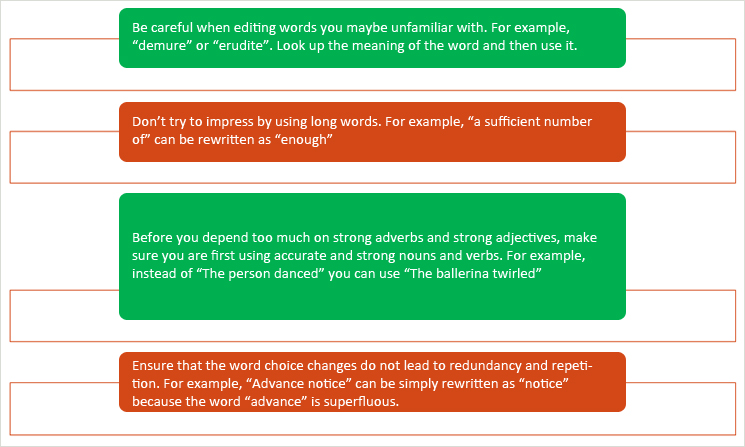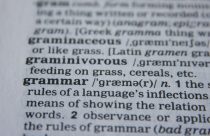Word Choice in Academic Writing: Tips to Avoid Common Problems

What is “Word Choice” in Writing?
‘Word Choice” in writing is the usage of effective and precise language that conveys information not just in a functional way, but also to enlighten the reader. Effective word choice examples are the ones that use clichés sparingly, focuses on denotations and connotations, delivers straightforward meaning, avoids jargon, and is not characterized by a wide vocabulary.
Why is “Word Choice” Important in Writing?
As an author, choosing the right words while writing a manuscript is crucial for success. Academic writing, like most other forms of writing, is a series of choices. When it’s time to write, you have to carefully choose words that can clearly express the idea and then decide how you will rearrange those words into phrases, sentences, and even paragraphs. A strong word choice makes it easier for readers to understand the concept. It clarifies, explains, and expands ideas.
While evaluating word choice, it is important to address the concerns that restrict the author from disseminating correct information to the readers.
Some of the most common problems concerning word choice usage include the following:
Misused Words
Sometimes in a haste or out of ignorance, authors tend to use incorrect words. This arises mostly in cases of commonly confused English words.
Example 1: There were averse effects.
Revision 1: There were adverse effects.
Reason for change: “Averse” means to be disinclined towards something, whereas “adverse” means detrimental.
Example 2: The journal excepted your article for publication.
Revision 2: The journal accepted your article for publication.
Reason for change: “Except” means to exclude something, whereas “accept” is the consent to receive something.
Words with Unwanted Connotations or Meanings
Example 1: I sprayed the ants in their personal places.
Revision 1: I sprayed the ants in their hiding places.
Reason for change: The first sentence has a double meaning. The second sentence conveys the intended meaning and is completely clear.
Example 2: I want to do something different in my presentation.
Revision 2: I want to do something unique in my presentation.
Reason for change: “Different” mean something other than the regular activities, whereas “unique” implies something completely unusual and unrelated to the regularly presentation practices.
Using Complex Words Instead of Simpler Words
Example 1: “Conventional wisdom” is a relatively new designation.
Revision 1: “Conventional wisdom” is a relatively new term.
Reason for change: The first sentence uses a complex word, whereas in the second sentence, it is substituted by a simple word with a clear meaning.
Example 2: It was difficult to comprehend.
Revision 2: It was difficult to understand.
Reason for change: The word “comprehend” is substituted by “understand” without changing the meaning of the statement.
Awkward Word Choices
Example 1: Child students’ consciousness for marine education still remains an open research problem for creating a suitable teaching plan.
Revision 1: Consciousness among young students for marine education still remains an open research problem for creating a suitable teaching plan.
Reason for change: The italicized phrase in the first sentence does not read well and lacks clarity to a certain extent, whereas the second is certainly clearer.
Example 2: I came to the realization that the answer is incorrect.
Revision 2: I realized that the answer is incorrect.
Reason for change: Sentence revised to avoid wordiness and provide direct information.
Incorrect Use of Words with Similar Meaning
Example: When discussing the definition of tuberculosis, we should address that physicians are required to quickly identify patients with risks of infection with pathogens.
Revision: When discussing the definition of tuberculosis, we should address that physicians are required to promptly identify patients with risks of infection with pathogens.
Reason for change: The word “quickly” means “rapidly, with speed,” whereas “promptly” means “both soon and quickly,” so the latter is the right word choice in this sentence.
Use of Jargon
Example: The dialectical interface between neo-Platonists and anti-disestablishment Catholics offers an algorithm for deontological thought.
Revision: The dialogue between neo-Platonists and certain Catholic thinkers is a model for deontological thought.
Reason for change: The words “dialectical interface”, “anti-disestablishment” make the sentence wordy and would not be understood by all the readers. The revised statement is a simplified statement to be easily understood by all without compromising its meaning.
Use of Clichés
Example: I am as loose as a goose today.
Revision: I am very relaxed today.
Reason for change: The cliché “loose as a goose” is replaced in the revised version to give direct information in a simpler manner.
Wordiness
Example: I came to the realization that this method won’t work out.
Revision: I realized that this method won’t work out.
Reason for change: The phrase “came to the realization” is replaced by “I realized” to reduce the word count and not hamper the meaning of the sentence.
Choosing Specific Words
Example: Previously, a substantial number of patients with HCAP were defined as having community-acquired pneumonia.
Revision: Previously, a substantial number of patients with HCAP were diagnosed as having community-acquired pneumonia.
Reason for change: The first sentence uses a word that conveys a meaning that is not as accurate as the word in the second sentence (also, from a content perspective, “diagnosed” is the accurate technical term here).
Moving on, word choice in academic writing also involves using words that are shorter and more concise than their lengthier counterparts, even though they mean the same. The table given below lists some such words.
|
Longer phrase |
The concise word |
|
I came to the realization that |
I realize that |
|
Concerning the matter of |
About |
|
During the course of |
During |
| In the event that |
If |
|
In the process of |
During, While |
| Regardless of the fact that |
Although |
|
Due to the fact that |
Because |
| In all cases |
Always |
|
At that point in time |
Then |
|
Prior to |
Before |
| Keeping in mind |
Considering |
Practice following exercises to improve word choice while writing a manuscript:

So, now you know that when you choose words to express your ideas, you not only have to think about what makes sense and sound the best to you but also what will make sense and sound the best to your audience. Thinking about the reader and their expectations will also help you make better decisions. As word choice is important, reviewing the evaluative modifiers is one way to revise for word choice.
Do follow these tips and choose the right words when writing your manuscript. Here’s to flawless academic writing!
How do you plan on overcoming the challenge of word choice in academic writing? Let us know about your experience while drafting academic papers in the comments section below!
You can also visit our Q&A forum for frequently asked questions related to different aspects of research writing and publishing answered by our team that comprises subject-matter experts, eminent researchers, and publication experts.
References:
The Writing Center at UNC-Chapel Hill. Word Choice. Retrieved from http://writingcenter.unc.edu/handouts/word-choice/
Word Usage in Scientific Writing. Retrieved from http://www.chem.ucla.edu/dept/Faculty/merchant/pdf/Word_Usage_Scientific_Writing.pdf
Statistics Solutions. 5 Literal Word Choices to Improve Your Writing. Retrieved from http://www.statisticssolutions.com/5-literal-word-choices-to-improve-your-writing/










Quite helpful!
Fabulous and concise-
Thank you! Please send me your newsletter.